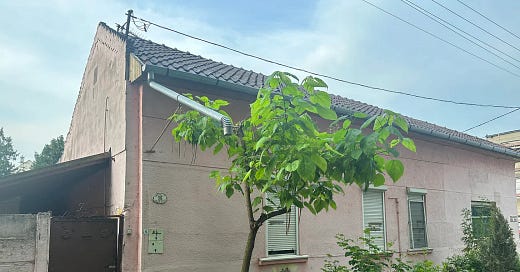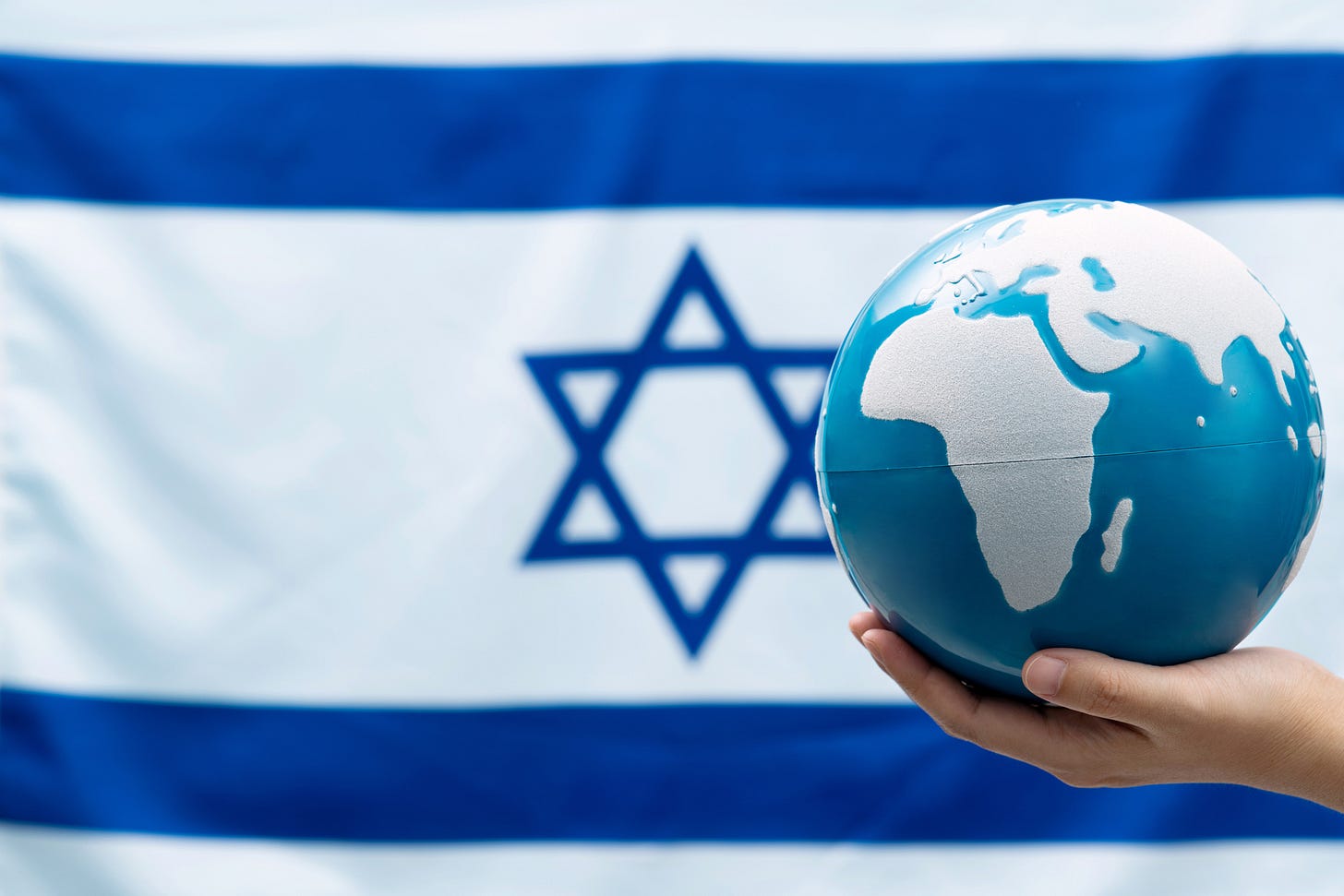"Nobody cried for us."
“I recently stumbled on those words, spoken by my relative in her testimony for the Shoah Foundation in the late 1990s. They have never been more prescient.”
By Leah Eichler
Guest Essay
I have been a bit muted of late, which is unusual for me, as I process the shock of the brutality in Israel. A part of me wants to hunker down. To hide. Words don’t come to me as they usually do.
Work that I love, which right now is the writing of a blended memoir, The Bubbe Tapes, has nearly come to a halt. The intimacy I felt with the subject – my search for my grandmother’s story and how it will be valued in generations to come – seems suddenly cracked. I’m figuring out how to get close to it again.
The irony is, her story is more valuable than ever, and I’m struggling to admit that. I consider myself very liberal. I remember where I was when I heard the news that Prime Minister Yitzhak Rabin was assassinated. I cried not only for him, but for the two-state solution that seemed so close to our grasp.
I think back to almost 20 years ago when I decided to name my son Azriel, which means “God is my help.” At the time, I thought that even if he turns out to not believe in our faith, I can sneak some protection into his name. That decision perturbed my father, who was born in hiding in Bratislava in 1944.
“They’ll know he’s Jewish,” my dad told me, with concern after he met my infant boy. “He’ll never be able to hide. They will find him.” My father, along with his siblings, had Christian names to match their Christian documents while in hiding. “Who are ‘they?’” I scoffed at the time.
Who are they, indeed.
I’m trying to recollect the bravado I had when I was young. I spent my days at university not focused on classes but fighting against racism – against antisemitism. “Never Again” would really be never again. How can we forget?
Except now I worry that we did, because what else can you call this barbaric assault by Hamas except a pogrom? That archaic word, a relic from the Old World, that struck fear in the hearts of my grandparents, great-grandparents and great-great grandparents – has come back to haunt us. The generational trauma that resides deep in my bones is surfacing and I’m struggling to reconcile that with my fervent desire for there not to be a war, or indiscriminate retaliation. I want it to stop. Please, stop.
At the thought of terrorists infiltrating Kibbutz Be’eri, my mind wanders back to the small house, pictured above, where my grandparents lived with my grandfather’s sister and others on the outskirts of Nyíregyháza, Hungary, in the early days of the Holocaust.
It was from this house that my grandfather was taken, forced into years of slave labor. It was from this house that my grandmother, following orders, returned to her village in Beregdaroc, to await deportation. This house still resides on the outskirts of the city, and I can’t help but think that they chose it purposely, to try to make themselves small and stay out of everyone’s way.
I visited this house on a trip to Hungary earlier this year with my Azriel and my boyfriend, Isac. I was eager to see the inside of the house, wondering if there was a sign, any sign, of my family there.
I knocked on the door when we arrived, certain someone was home. Unfortunately, the current resident refused to let us in, refused to even talk to us, her replies nonsensical but angry, or maybe afraid. “My mother has glaucoma,” she yelled through the shuttered windows. “Don’t come any closer.” Her many dogs barked behind the sealed gates.
I won’t lie: It hurt not to go inside. Earlier in the day, we visited my grandfather’s village of Napkor. The town administrator revealed to us through a handwritten ledger, easily a hundred years old, that many of my family members were buried there before the war.
“Can we see the cemetery?” I asked. The administrator spoke to another fellow and we were instructed to follow him in our car. We drove precariously down dirt roads not meant for vehicles, the bush slapping our windows as we prayed not to get stuck in the mud. There were the sounds of gunshots in the distance but Karesz, our guide, said it was a recording, meant to keep predatory birds away from the nearby farms.
We drove a few kilometers before I asked Karesz with concern: “Where are they taking us? The last time my people followed government officials into the backwoods it didn’t end well for us.” I tried to joke. No one laughed.
Eventually, we ended up at the Jewish cemetery, a walled enclave in the middle of nowhere. You could tell that the steel door had been previously busted open but then haphazardly fixed. Weeds and trees grew everywhere, and I carefully watched my footing so as not to trip.
“Get out, get out,” yelled Karesz, and my heart sank.
“Why?” I asked, the muscles in my shoulders on high alert. “What did you see?”
“That’s it, there’s nothing here. Nothing.” Every last tombstone has been stripped from the graveyard. I imagined the bones underground, my family’s bones, somewhere among the trees. I wanted to wait, to stay awhile and linger with their spirits. But it was clear from Karesz’s tone that we needed to leave.
Since my return from Hungary, I’ve had a lot of time to think about why I need these signs of life, even when most of that generation of Holocaust survivors are now gone. Maybe it’s the journalist in me looking for evidence. Maybe it’s my spiritual side, yearning to communicate with the dead. Or maybe, it’s simply that I need to prove to myself that the pain I’ve carried with me since birth has its root somewhere – and touching its source will help me to let it go.
This project, The Bubbe Tapes, began in 1998 when I sat down to interview my grandmother about her life story. Over several weeks, she told me a mix of the truth and, I believe, things that she wanted me to hear. She wanted to protect me, even if on some level she knew that she couldn’t.
I learned recently that while my grandmother may not have willingly revealed all her stories, her first cousin, Jolan Klein, tried her best to do so. Jolan was about 10 years younger than my grandmother when she was deported, along with my grandmother, to the ghetto in Beregszasz, before they were moved to Auschwitz. In the late 1990s, around the same time that I encouraged my grandmother to sit down with me at her kitchen table and let me record her memories, Jolan gave her testimony to the Shoah foundation.
In it, the interviewer asked her what it was like when they were rounded up in Beregdaroc on the day of the deportation. I watched Jolan, who died in 2018, recalling the moment when she and the other Jews lined up outside the administrative building – the same building I visited in June – as horse-led carriages were about to carry them away. Jolan told the interviewer that the villagers taunted them while they were being boarded onto the carriages. They called them names. Insulted them.
“Nobody cried for us,” she recalled.
My cousin’s words are now 25 years old, but they will be forever carved out in my memory.
This past week, as I’ve been doom-scrolling the horrifying news of Jews being slaughtered yet again, Jolan’s words have been echoing in my mind.
Will atrocities against Jews once again be justified? With 150 hostages still being held by Hamas, I’m watching carefully to see who will cry for us, and who will jeer.
Leah Eichler is an author, essayist and publisher of Esoterica Magazine. She's currently working on a blended memoir about contemporary Jewish identity and the legacy of the Holocaust.
JEWDICIOUS subscriptions to all content from our “Original 18” are FREE till the end of 2023!
From unpacking history and politics to navigating the nuances of family and personal relationships to finding the human angle on sports and entertainment — plus our unsparing take on what’s happening in the Jewish world — the canvas at JEWDICIOUS is limitless! JOIN US!!







After the Holocaust, the Jewish inhabitants of small rural Hungarian settlements disappeared forever.
Seventy years later, with the exception of the county capitals and a few larger rural towns, the only sign of Jews having lived there for 200-300 years is the orphaned, often untended Jewish cemetery. The rural, especially village Hungarians viewed the Jews with an inexplicable hatred.
In 1944, many of these people came to Budapest. A shocking documentary:
https://www.youtube.com/watch?v=4ygZB1MTRR4
Leah, have you listened to your other cousin's Holocaust testimony? I just had it transcribed (Ilona Klein) and it was very detailed compared to my own grandmother's words. I hope you give it a listen.